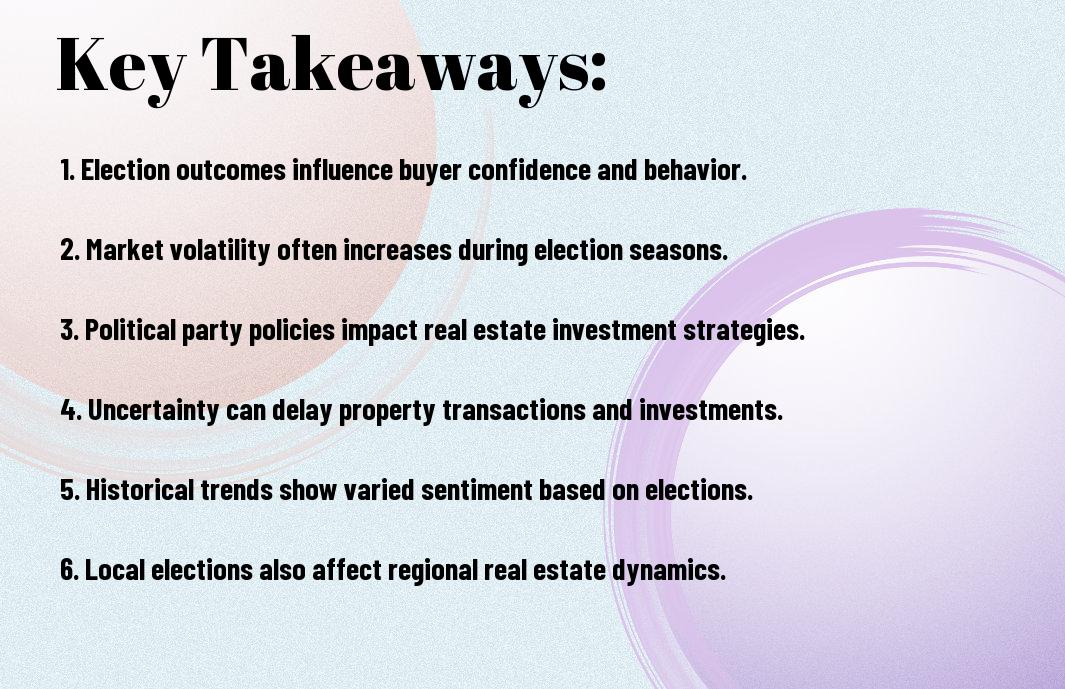Election outcomes can significantly influence market sentiment, especially in the real estate sector. As you navigate the complexities of property investment and ownership, understanding how election cycles impact buyer behavior, lending rates, and policy changes is crucial. This blog post will explore the various ways in which elections shape market attitudes and offer insights to help you make informed decisions in your real estate endeavors.
Key Takeaways:
- Election cycles often influence market sentiment as uncertainty surrounding political outcomes can lead to fluctuations in real estate investments and pricing.
- Real estate markets may experience increased activity before elections as buyers and investors attempt to secure properties before potential policy changes, while post-election periods can lead to stabilization or shifts based on newly enacted policies.
- Overall public sentiment and consumer confidence during election years play a significant role in shaping real estate demand, with differing impacts depending on the political climate and candidates’ economic proposals.
Understanding Election Cycles
The election cycle is a sequence of political events, typically spanning four years, that culminates in the selection of government leaders. These cycles involve various phases, including primaries, general elections, and the transition period, each affecting voter behavior and market dynamics. Understanding how these cycles unfold helps you grasp their influence on the broader economic landscape, particularly in real estate, where sentiment can fluctuate significantly based on political outcomes.
Historical Context
Above all, the historical context of election cycles reveals patterns of economic behavior in the real estate market. Past elections often demonstrate shifts in property values and buyer sentiment, influenced by the policies and platforms of candidates. By examining historical data, you can identify trends that may re-emerge in future election cycles and predict how they might affect your investment strategy.
Key Theoretical Frameworks
Around the election cycle, various theoretical frameworks exist to explain how political events shape market sentiment, particularly in real estate. These frameworks help you analyze the relationships between political stability, fiscal policy, and investor confidence, thereby providing context for your decisions in the market.
With several key theoretical frameworks at play, such as the political business cycle theory and consumer sentiment theory, you can better understand how election outcomes influence economic indicators. Political business cycle theory suggests that governments may manipulate fiscal policy to boost economic performance before elections, impacting real estate demand. Meanwhile, consumer sentiment theory indicates that your confidence in the economy and its stability drives your purchasing decisions, particularly when investing in real estate. By understanding these frameworks, you can make more informed decisions that align with the cyclical nature of the market amid political changes.
Market Sentiment in Real Estate
You may often hear the term “market sentiment” in the context of real estate, as it represents the overall attitude and feelings of investors and buyers towards the real estate market. This sentiment can greatly influence market trends, pricing, and demand, making it an crucial aspect to monitor for informed decision-making in property investments.
Definition and Importance
Before diving deeper, it’s important to define market sentiment as the collective emotional response of buyers and sellers to various stimuli, including news, economic indicators, and social trends. Understanding sentiment is vital because it can sway market conditions and buyer behavior, subsequently impacting your real estate investment choices and strategies.
Factors Influencing Sentiment
Factors affecting market sentiment are multifaceted and can vary significantly. These influences might include economic stability, interest rates, government policies, public perception of the real estate market, and local market conditions.
- Economic stability: Strong economies can boost confidence in real estate.
- Interest rates: Fluctuations can either encourage or deter purchases.
- Government policies: Regulations and incentives shape market dynamics.
Assume that each factor interacts and impacts your perception and subsequent actions in the real estate market.
Sentiment can shift quickly based on news cycles, cultural movements, and significant local or national events. This quick change often leads to varying behaviors among investors and buyers.
- News cycles: Positive or negative news can alter public perception rapidly.
- Cultural movements: Shifts in societal values can redefine what buyers are looking for.
- Local events: Area-specific developments, such as new schools or infrastructures, can drive interest.
Assume that by understanding these influences, you can better navigate the real estate landscape and enhance your decision-making process.
Empirical Analysis of Election Cycles
For investors and stakeholders in the real estate market, understanding the impact of election cycles is imperative. Various studies highlight how political sentiments and election outcomes can influence market behaviors and housing prices. You can leverage this empirical analysis to make informed decisions regarding your investments during these critical periods.
Case Studies from Recent Elections
Below are some pertinent case studies that illustrate the relationship between election cycles and real estate market trends:
- 2016 US Presidential Election: A 5% increase in home prices post-election, driven by market optimism regarding tax reforms.
- 2020 US Presidential Election: A temporary dip of 3% in real estate transactions leading up to the election, followed by a 10% surge in the first quarter of 2021 as policies stabilized.
- UK General Election 2019: A 4% rise in property prices post-election as confidence returned after Brexit uncertainty.
- 2018 Midterm Elections: A notable 7% spike in residential sales shortly after election results due to investor confidence in maintaining the status quo.
Statistical Correlations with Market Trends
Recent analyses demonstrate a clear connection between election outcomes and housing market trends. You can observe fluctuations in property values and sales volume, often correlating with the political climate and public sentiment surrounding an election.
With extensive data collection and analysis, researchers have found patterns indicating that elections can lead to volatility in real estate markets, especially in battleground states. Post-election surveys suggest that consumer confidence impacts real estate decisions significantly. You should consider these trends when planning your real estate investments, as timing your entry or exit around election cycles might enhance your returns. Additionally, understanding local and national political climates can offer insights into potential market shifts that could affect your portfolio.
The Role of Government Policies
Once again, the influence of government policies on market sentiment cannot be overstated in the real estate sector. Whether through regulations, tax incentives, or investment in infrastructure, policy decisions made during electoral cycles can significantly impact your confidence as a buyer or investor. These changes can either bolster market activity or contribute to stagnation, depending on their nature and timing.
Regulatory Changes
Around election periods, regulatory changes are often introduced, reshaping the real estate landscape. Policies regarding zoning laws, environmental regulations, and property taxes can introduce uncertainty or opportunity for you as a stakeholder. Understanding these shifting regulations is necessary, as they can dictate the feasibility of your investment decisions.
Fiscal Measures and Economic Impact
Below election cycles, fiscal measures, including tax policies and government spending, play a significant role in shaping the real estate market. These measures can create rippled effects that influence economic stability and property values, impacting your prospect of entering or thriving in the market.
A well-informed understanding of fiscal measures helps you anticipate changes that may impact your investments and property values. For example, an increase in government spending on infrastructure can lead to improved accessibility and attractiveness of certain areas. Conversely, cuts in spending might result in declining interest in those neighborhoods. By staying abreast of fiscal policy changes, you can make informed decisions that align with the evolving landscape of the real estate market.
Investor Behavior During Elections
Your approach to real estate investment can be significantly influenced by the political climate during election cycles. Investors often display heightened sensitivity to potential policy changes, which can lead to a reassessment of risk and overall market dynamics. This uncertainty may prompt shifts in investment patterns, where some might become more conservative, while others perceive opportunities arising from political transitions.
Shifts in Investment Strategies
Along the election timeline, you might notice changes in investment strategies as political candidates advocate various economic policies. Investors often pivot toward sectors that align with the anticipated regulatory environment, such as focusing on affordable housing if a candidate supports housing reforms. This dynamic creates opportunities as well as challenges, necessitating flexibility in your investment decisions.
Risk Assessment and Market Predictions
Risk assessment during election cycles becomes integral to your investment strategy, as varying political outcomes can lead to unpredictable market movements. You may find yourself analyzing potential policy implications, considering how they could reshape demand, supply, and overall market stability.
Market volatility is often amplified during election seasons, leading you to scrutinize historical data and expert forecasts closely. Understanding the nuances of how political events influence economic indicators can assist you in making informed predictions about market behavior. By closely monitoring polling data, campaign messages, and public sentiment, you can assess the risks involved and adapt your strategies accordingly, enhancing your potential for successful investments.
Regional Variations in Market Response
Not all regions respond uniformly to election cycles. Factors such as local economic conditions, housing demand, and demographic trends can alter how market sentiment shifts. For a deeper understanding, check out Do Elections Affect the Housing Market? Here’s What …. Understanding these regional intricacies is vital in predicting the market reaction in your area.
Urban vs. Rural Dynamics
About the distinction between urban and rural markets can be significant. Urban areas may experience a heightened sensitivity to election outcomes due to larger investment pools and population density, while rural regions often show a more stable, less volatile response. The interplay of local industry and demographic shifts can further shape these reactions.
Local Policy Influence
Variations in local policies also affect market sentiment. Each region boasts different regulations that can sway housing demand, tax incentives, or zoning laws, impacting buyer confidence as elections approach.
Indeed, local policy changes can lead to immediate shifts in how the real estate market behaves during election cycles. For instance, you may witness fluctuations in prices as jurisdictions implement new regulations affecting property taxes, development approvals, or rent control measures. Understanding these local nuances provides you with the insight necessary to navigate the real estate landscape effectively during election seasons.
Final Words
Upon reflecting on the impact of election cycles on market sentiment in real estate, you may recognize the importance of staying informed about political climates and policy implications. Your understanding of these dynamics can empower you to make better investment decisions, as shifts in sentiment often influence property values and buyer behavior. By closely monitoring election outcomes and aligning them with market trends, you can navigate the real estate landscape more effectively, ensuring your strategies remain adaptive and informed throughout varying political climates.
FAQ
Q: How do election cycles influence buyer confidence in the real estate market?
A: Election cycles can significantly influence buyer confidence in the real estate market due to political uncertainty and changes in government policy. During an election year, potential buyers may hesitate to make significant financial commitments such as purchasing a home, as they await clarity on the policies that might affect interest rates, tax benefits, and housing regulations. This uncertainty can lead to a temporary slowdown in home sales as buyers adopt a wait-and-see approach until after the election results are declared and the future direction of housing policies becomes clearer.
Q: What impact do election outcomes have on real estate pricing trends?
A: The outcome of elections can lead to shifts in real estate pricing trends, often depending on the policies proposed by the elected officials. For instance, if a candidate promising tax cuts and deregulation wins, it may lead to increased optimism among investors, likely pushing real estate prices up. Conversely, if a candidate advocating for stricter regulations or increased taxes is elected, apprehension may result in a stall or decline in prices as buyers and investors adjust their expectations. Historical data shows that for the first few months following an election, markets often experience volatility, with pricing stabilization occurring as the new policies are enacted and their implications become clear.
Q: How do political parties’ platforms during election cycles affect the real estate market?
A: Political parties typically have distinct platforms that may promise different approaches to economic issues, including housing. These platforms can influence market sentiment significantly. For example, if one party promotes affordable housing initiatives and support for first-time home buyers, this could encourage increased market activity and boost home sales. On the other hand, if policies are introduced that could restrict development or raise taxes, it can deter investors. Potential buyers and sellers closely monitor these platforms, and their perceptions of future market conditions can influence their decisions leading up to and immediately following an election.







